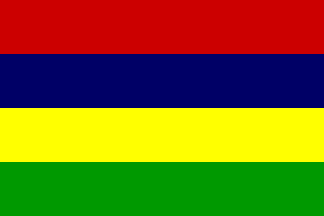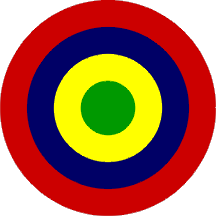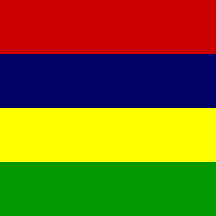
Last modified: 2006-12-09 by antónio martins
Keywords: mauritius | key (red) | anchor (red) | star: 5 points (fimbriated) | dodo | stella clavisque maris indici | sambur deer | deer (red and white) | deer: sambur |
Links: FOTW homepage |
search |
disclaimer and copyright |
write us |
mirrors

The Album 2000 [pay00] says:
1. National Flag and Jack.Four-striped red over blue over yellow over green.2:3
Flag adopted upon independence,
on 9 January
1968.
Phil Nelson, Oct 2005
On 12 March 1992 Mauritius became republic, but the
independence flag didn’t change.
Jan Zrzavy, 09 Oct 2002
According to the DK Ultimate Pocket Flags of the World (1997) [rya97], «the flag was designed by the College of Arms in Britain prior to independence and is a simple statement of the colors found in the coat of arms». The same page (110) has also a more bombastic symbolism:
The flag was actually registered at the College of Arms
on 9 January 1968, it was granted by Royal Warrant and the flag first
officially hoisted on 12 March 1968 (the day of independence). However,
whatever the College’s original intention the significance
of the colours are now officially given (although rewritten by myself) as:
The red stripe represents the struggle for freedom and independence, while
blue stands for the Indian Ocean. The yellow stripe symbolizes the new light
of independence, and the green represents agriculture together with the
yearlong colour of a lush country. (I unfortunately cannot find the original
wording.
Christopher Southworth, 08 Mar 2004
This could easily be interpreted as only minor variants (through
political expediency, perhaps) of the four quarters of the
arms. The red key could be seen as equating to self-determination, as
could the golden settlers’ ships to the search for a new future. The
star over the waters would easily equate to the ocean, as would the sugar
canes to the vegetation.
James Dignan, 08 Mar 2004
All the sources I consulted (e.g. [pay00], [smi82], [vdv00]) have these colours in “normal” shades. This particularly goes for the blue, and to less degree (or maybe less obvious) for the red. The shades are not particularly important when looking at the national flag only — but when it comes to ensigns, the questions arise — since these are based on british model, one would expect the shades to be the same as for the Union Jack.
For the red I have not noticed anything
special — it seems that all these sources have the
same red thoughout and I would tend to present it as normal R
(![]() ),
but for the “samness” with the
“Post Office Red”, R+
(
),
but for the “samness” with the
“Post Office Red”, R+
(![]() ).
).
The blue is not that simple, here is how blue used in different flags would be coded like this:
| [pay00] | [smi82] | [vdv00] | |
|---|---|---|---|
| National Flag | |||
| CG Ensign | |||
| Civil Ensign | |||
| State Ensign |
* [smi82] shows civil ensign with blue somewhat lighter then normal, but that may be just a printing effect (I think)
So, either the national flag in the state
ensign is indeed different from other variations
(as Smith has it), or the
blue ensign is not that dark as in
British case.
Željko Heimer, 13 Jun 2002

Roundel of the national colours.
[pay00]
Željko Heimer, 13 Jun 2002
Mauritius Coast Guard operated three planes and use the roundel as
above.
Dov Gutterman, 20 Jun 2004

Mauritius’ planes carries a 1:1 version of the national flag.
Dov Gutterman, 10 Feb 2000
Mauritius Coast Guard operated three planes and use the national
flag as fin flash. The book [cos98]
shows the fin flash in square form, but a
photo
on line shows a regular flag.
Dov Gutterman, 20 Jun 2004
The national flag is painted on the fin, says Album
2000 [pay00]
Željko Heimer, 13 Jun 2002
The coat of arms of Mauritius is described as follows in Dorling-Kindersely Pocket-Book [rya97]:
The coat of arms was granted on 25 August 1906, and depicts various attributes of the island. In the lower right quarter is a key and on the left-hand side is a white star, which are referred to in the Latin motto "Stella Clavisque Maris Indici" ("The Star and the Key of the Indian Ocean"). The supporters are a dodo and a deer each holding a sugar cane, the island’s staple crop.The caption of the image in the same source gives additional details:
The motto on the scroll reads «STELLA CLAVISQUE MARIS
INDICI» («Star and key of the Indian sea»).
Vincent Morley, 03 Mar 1997
In some sources the star is shown voided. According to Album 2000
[pay00] this is wrong.
Željko Heimer, 13 Jun 2002
Anything below this line was not added by the editor of this page.